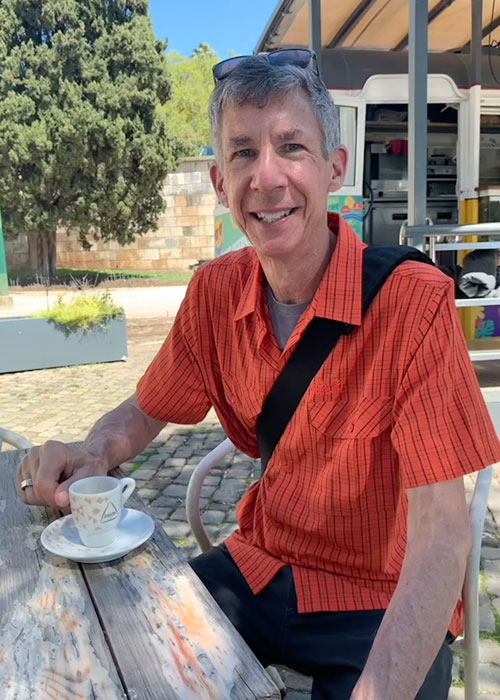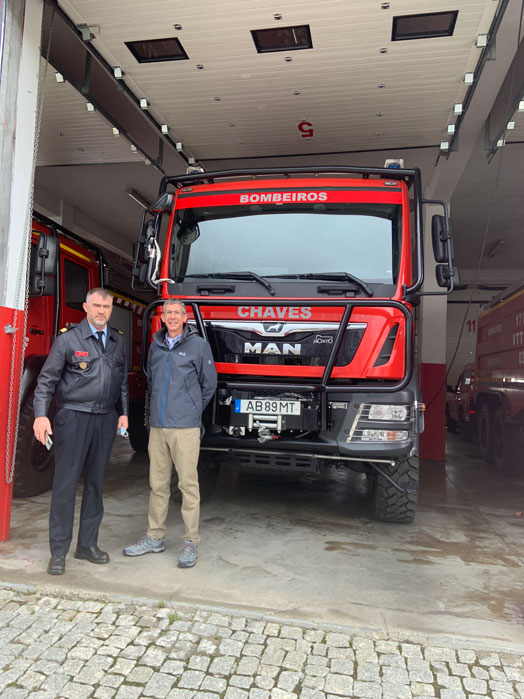Fulbright Chronicles, Volume 1, Number 4 (2023)
Author
Michael R. Czaja
Abstract

Fulbright Specialists often execute projects during times of complexity and change. Recognizing how an individual project fits within the larger environment contributes to its success. A recent rural fire management project in Portugal provides applicable lessons for those Fulbrighters whose host is dealing with changes to long-established processes. One key lesson is to never underestimate how individual experience and insight contribute to mentally framing the project. Solutions applicable today may not be appropriate tomorrow.
Keywords
Portugal • fire management • complex • rural
Introduction
During the 2021 celebration of the Fulbright Program’s 75th anniversary, the Fulbright Specialist Forum highlighted the role Fulbrighters play in building connections in a complex and changing world. My experience as a 2022 Fulbright Specialist in Portugal reflected this unique opportunity provided to those participating in the program. Throughout my public administration project, I often framed my experience with a statement made by the French political scientist, Professor Bernard B. Fall.
Professor Fall presented a lecture at the US Naval War College in December, 1964. The topic dealt with understanding the political dynamics of insurgencies then confronting governments across the globe. As a conclusion, he introduced a concept I suggest continues to be applicable to Fulbright Specialists when attempting to conceptually place their projects within complicated, rapidly evolving situations or problem sets across various disciplines: “If it works, it is obsolete.” As Professor Fall observed, the reality on the ground may require replacing well-working but routine solutions with innovative approaches and ideas.
Changes in Portuguese Rural Fire Management
I used Fall’s observation as a mental reference during my project, which focused on Portuguese rural fire management. This included a mix of wildland fire management, rural civil protection, and forest/landscape management. In a country that is experiencing a rural exodus to urban and coastal areas, rural civil protection is a significant concern. In many locations, the land was simply abandoned, and flammable vegetation is expanding in the unmanaged landscape. Often, property ownership is unknown, a situation the Portuguese government is addressing. Portugal, like other countries in southern Europe, is experiencing rapidly changing fire behavior not previously experienced. Attributed to climate change, a lack of traditional management of rural lands, and a buildup of flammable fuels, the resulting behavior includes an extended fire season, with increased fire intensity and severity. This not only impacts the landscape, but also threatens rural communities. Taken together, these factors create a complex problem set requiring an integrated response to meet ever-evolving challenges at various scales.
Portugal’s national-level Agency for Integrated Rural Fire Management (AGIF) acted as my host. Established in 2019 after the country’s 2017 severe wildland fires, AGIF is responsible for the planning, strategic coordination, and assessment of the recently developed Integrated Rural Fire Management System (SGIFR). Similar to the Fulbright Specialist’s role in building connections, AGIF is designated to be the unifying and enabling authority that brings stakeholders together and guides them towards the same national goal. That is, to protect Portugal from severe rural fires.
The Fulbright project’s objective was to understand SGIFR stakeholders’ beliefs and attitudes toward critical wildland fire management topics. Over the course of the 32-day project, I spoke with 53 public and private sector stakeholders across Portugal. These interviews were centered on three SGIFR pilot projects located in the country’s north, center, and south. During the project, I traveled from Chaves, in the far north on the Spanish border, to historic Coimbra in the center, and to Faro in the southern Algarve region. In turn, AGIF is using my findings to design a communication strategy and engagement initiatives with the main stakeholders, promoting SGIFR implementation.
Applicable Lessons
As the project progressed, I identified several applicable lessons that may be of interest to other Fulbrighters. The first was the need to frame what I was doing within the scope of overall public policy processes. To do so, I needed to understand the status of rural fire management within the country. The past five years have been a time of notable institutional change and growth in Portugal’s fire preparedness and response. The 2017 fire season’s severity resulted in extensive property damage, the loss of over 100 lives, and systemic response failures. As a result, the government established two technical committees to complete a detailed process review. One recommendation resulted in the establishment of AGIF. At the same time, there has been some degree of organizational learning and adaptation within the country’s larger fire management community.
Within the past two years, significant policy and legal actions occurred, reflecting a change in Portugal’s governmental processes. The National Plan for Integrated Management of Rural Fires received approval in 2020, with the implementing National Action Program approved the following year. A subsequent component of the Program was the development of three pilot projects taking place from 2021 to 2023. My host agency was responsible for their coordination and implementation. Decree-Law 82/2021 (October, 2021) established the SGIFR in mainland Portugal and defines its operating rules. Finally, a new national government took office in March, 2022. This was a remarkable amount of political and policy activity within a two-year period. My project took place during this activity and it was essential for me to understand how it fit into the larger picture.
Another lesson was the importance of both understanding the relationship between various stakeholders or entities and establishing connections during this period of rapid change. This included me working with AGIF as well as the project’s other Portuguese participants. Some stakeholders were candid in sharing that they didn’t support the creation of AGIF and others were critical of the SGIFR developmental process. I felt that, to the extent possible, I had a potential role in opening a dialogue and contributing to the collaborative process among SGIFR stakeholders.
Existing, structural communication gaps are expected to emerge within and between organizations during the implementation of an innovative, national-level system such as the SGIFR. Several participants stressed that Portugal’s governmental system was traditionally “stove piped,” with limited sharing of information and collaboration. The new SGIFR was, in certain ways, a disruptive and radical departure from the norm. It was forcing changes in both the requirement for stakeholders to work together and the introduction of best practices. I looked at my role as contributing to “A Portuguese solution to a Portuguese challenge.”
Recommendations at the conclusion of the project included an AGIF communication strategy that promotes interagency coordination. This strategy would highlight on-going activities at various governmental levels, such as at the region or sub-region, which encourage cooperation and trust among stakeholders. Specifically, this effort can focus on the sharing of data, knowledge, and expertise. Another proposal centered on a AGIF engagement activity. Two key stakeholders, the National Emergency and Civil Protection Agency and Liga Dos Bombieros Portugueses both have a common interest in professional development of emergency managers and firefighters. In the proposed engagement activity, these stakeholders, facilitated by AGIF, would jointly craft an integrated training, certification, and professional development process. This would provide an initial “win-win” situation for the two organizations, building the foundation for future collaboration. It would also meet both organization’s requirement for providing high quality, evidence-based training.
Personal Insight is Invaluable
Personally, the most significant lesson I learned was to never underestimate the knowledge and skills you bring to the project – not only professional and academic, but also the insight and familiarity one gains from general life experiences. This can assist when dealing with unexpected circumstances impacting the project. From various institutional perspectives, stakeholders discussed the critical relationship between rural socio-economic development and rural fire management, addressing the proven linkage between valuing a rural parcel and caring for it. These stakeholders stated that success in implementing the national plan is dependent on attracting people to live in, and properly manage, the country’s rural landscape. This requires a whole of government approach dealing with viable rural economies, education, healthcare, public safety, and other key factors.
Participating in the Fulbright Specialist program was an exceptional personal and professional experience. Without a doubt, it was a career highlight. I truly hope that the impact made by the project is equal to what I learned. As important, another role I see myself having as a Fulbrighter is to share what I learned. If the lessons from my project assist someone working within similar parameters in the future, then I consider that a success.
I didn’t anticipate this conversation when preparing for my project. However, my personal experience helped me to grasp the issue’s significance. My hometown in rural southwestern Colorado has a population of 1,400. Formerly economically dependent on coal mines and fruit orchards, the town recently saw a growth in organic agriculture and vineyards. However, not all residents benefit from this new economy. Like other small communities in rural regions, many people leave to seek better opportunities in larger metropolitan areas. Conceptually, I understood this unique aspect of the project and was comfortable discussing rural issues. In my summary to AGIF, I suggested that the issue of weak rural development could potentially put the national plan’s success at risk. There is no quick, short-term solution to this challenge. To be successful, the Portuguese government must attempt to slow down or reverse decades of migration out of the country’s rural interior. No single government agency holds all the answers. By law, AGIF participates in the design and integration of public policies that have an impact on rural fire management. At the national level, I suggested that AGIF propose a re-examination of policies and programs directed at rural socio-economic development. As Professor Fall observed, this requires a new way of thinking about a unique component contributing to successful rural fire management. In general, successful implementation of the national plan will require proposing creative and timely solutions to a complex challenge.
Sharing with Others
Participating in the Fulbright Specialist program was an exceptional personal and professional experience. Without a doubt, it was a career highlight. I truly hope that the impact made by the project is equal to what I learned. As important, another role I see myself having as a Fulbrighter is to share what I learned. If the lessons from my project assist someone working within similar parameters in the future, then I consider that a success. I certainly didn’t expect rural development to be identified as a critical component of successful rural fire management. Fulbrighters often conduct transdisciplinary projects in rapidly evolving, complex environments. Taking a step back, assessing new information, and clearly articulating a way forward is essential. As Professor Fall observed, a solution that works today can be obsolete by tomorrow.
Notes
- Bernard B. Fall, “The Theory and Practice of Insurgency and Counterinsurgency,” Naval War College Review 18, no. 3, art. 4 (1965): 17, https://digital-commons.usnwc.edu/nwc-review/vol18/iss3/4.
- “Mission,” Agency for Integrated Rural Fire Management, assessed October 3, 2022, https://www.agif.pt/en/about-agif/mission.

Biography
Michael R. Czaja, PhD, is a retired US Army officer and holds an affiliate appointment at Colorado State University. Most recently, he served as a humanitarian assistance advisor to the military in the US Forest Service’s Disaster Assistance Support Program. He currently is a Disaster Action Team volunteer with the American Red Cross’ Kaiserslautern (Germany) US military community chapter. Mike holds a BA in Social Science from Saint Bonaventure University, a MS in International Relations from Troy University, and a PhD in Human Dimensions of Natural Resources from Colorado State University. In 2022, he completed a Fulbright Specialist project in Portugal. Mike can be reached at mczajacrg@gmail.com or michael.czaja@colostate.edu
